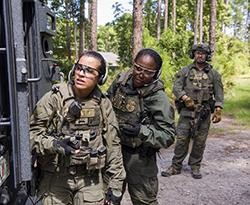The Bureau of Alcohol, Tobacco, Firearms and Explosives (ATF) is a unique and demanding federal law enforcement agency. ATF special agents investigate violations of federal laws related to firearms, explosives, arson, and alcohol and tobacco diversion, utilizing tactical, analytical, and intelligence gathering skills to build criminal cases.
Special agents require physical and mental fortitude, along with the ability to manage rigorous training, personal risks, irregular hours, and extensive travel. Agents are subject to reassignment to any ATF office within the United States or internationally. As of fiscal year 2020, ATF employed 2,597 special agents.
Responsibilities of an ATF Special Agent
The role of an ATF special agent is multifaceted, encompassing a wide range of critical law enforcement duties. These responsibilities are crucial for maintaining public safety and upholding federal laws.
- Criminal Investigations: Investigating criminal activities involving arson, alcohol, explosives, firearms, and tobacco.
- Witness Interrogation: Interviewing witnesses to gather information and build cases.
- Evidence Management: Collecting, analyzing, and documenting evidence.
- Search Warrant Execution: Executing search warrants to gather evidence.
- Interagency Collaboration: Participating in interagency task forces to address complex criminal activities.
- Undercover Operations: Conducting undercover operations to infiltrate criminal networks.
- Crime Scene Management: Managing and securing crime scenes to preserve evidence.
- Firearms Expertise: Demonstrating basic firearms competencies and identifying firearms and ammunition.
- Tactical Training: Engaging in firearms and tactical training.
- Defensive Tactics: Utilizing close-quarters defensive countermeasures.
 Special agents responding to an explosives incident.
Special agents responding to an explosives incident.
ATF Special Agent Eligibility Requirements
To become an ATF special agent, candidates must meet specific eligibility criteria. These requirements ensure that agents possess the necessary qualifications and characteristics to perform their duties effectively.
- Age: Between 21 and 37 years of age.
- Citizenship: U.S. citizenship.
- Security Clearance: Able to obtain Top Secret clearance.
- Federal Employment Eligibility: Eligible to work for the U.S. federal government.
- Education and/or Experience: Possess an undergraduate degree, or equivalent experience, or a combination of education and experience.
- Driver’s License: Valid driver’s license.
ATF Special Agent Application Process Timeline
The ATF special agent application process is lengthy and rigorous, potentially taking 12 months or longer. Failing any step may result in elimination from consideration.
Step 1: Online Application
ATF job announcements are posted on USAjobs.gov. It is essential for applicants to carefully follow the instructions and guidelines provided on the website.
- Review current special agent job announcements on USAjobs.gov.
- Develop a strong resume highlighting relevant skills and experience.
- Submit the application before the specified deadline.
- Await notification of application rankings.
Qualified applicants will receive a selection notice indicating successful completion of the initial phase, along with details regarding written and physical tests.
Step 2: Written and Physical Tests
- Special agent written exam.
- Special agent physical task test (PTT).
Passing both tests is mandatory to proceed further in the selection process.
Step 3: Interview and Background Check
- Panel interview.
- Candidate letter notice.
- Background investigation.
- Polygraph test.
- Medical exam.
- Drug test.
Successful completion of the panel interview, background investigation, and all other tests leads to receiving an “Enter on Duty” letter, signaling readiness to report for training and new hire orientation.
For questions or comments about the special agent career or application process, contact [email protected].
